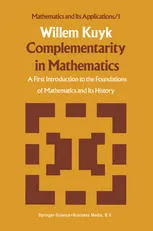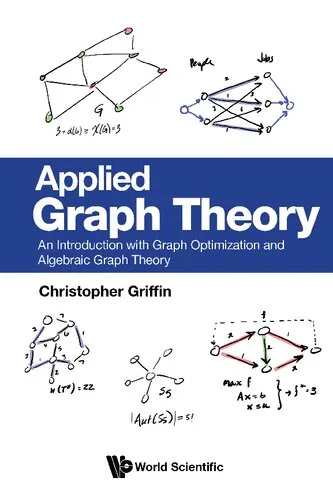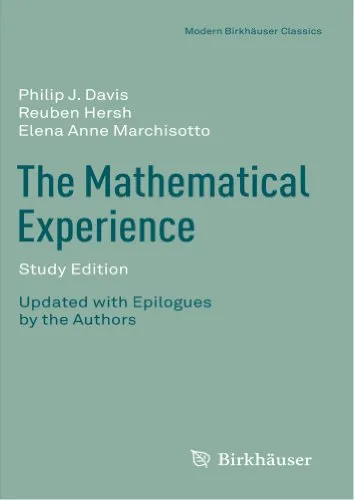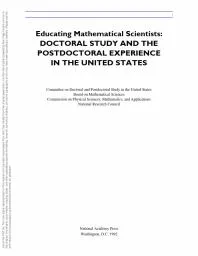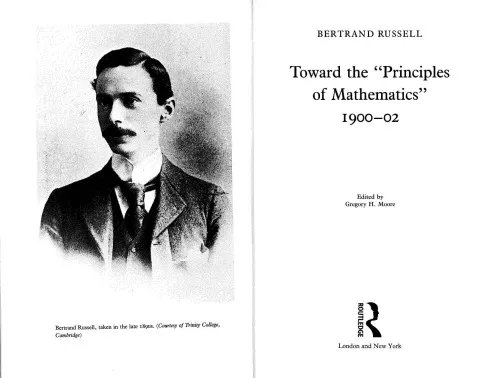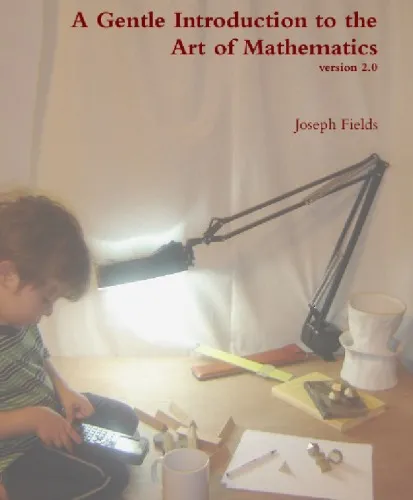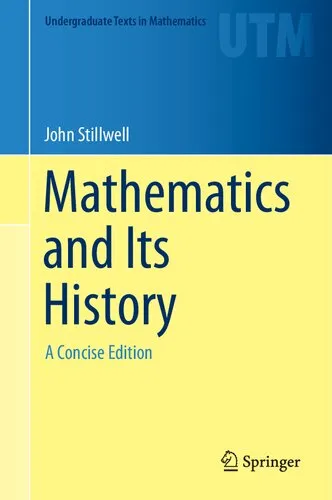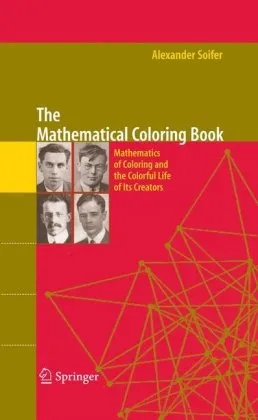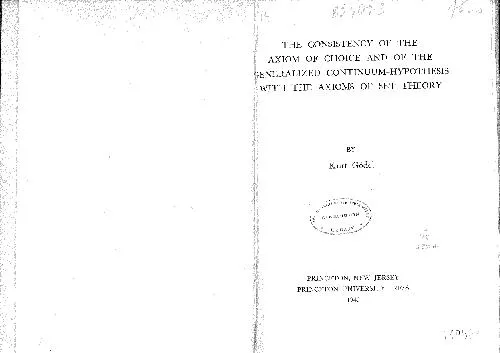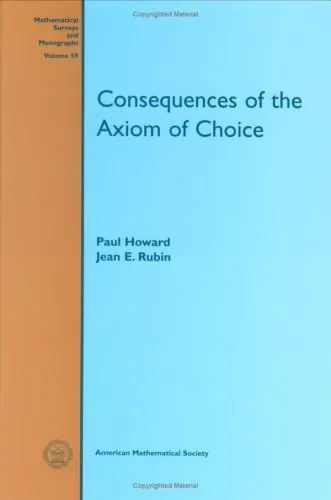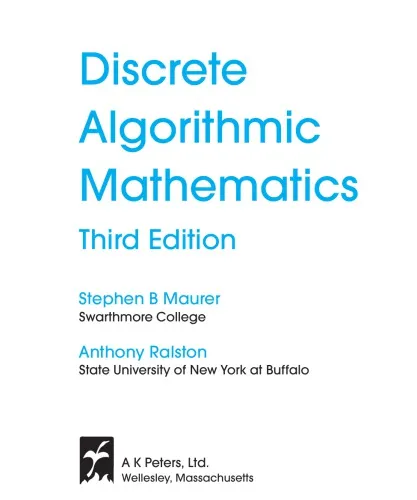Complementarity in Mathematics: A First Introduction to the Foundations of Mathematics and Its History
4.0
بر اساس نظر کاربران

شما میتونید سوالاتتون در باره کتاب رو از هوش مصنوعیش بعد از ورود بپرسید
هر دانلود یا پرسش از هوش مصنوعی 2 امتیاز لازم دارد، برای بدست آوردن امتیاز رایگان، به صفحه ی راهنمای امتیازات سر بزنید و یک سری کار ارزشمند انجام بدینکتاب های مرتبط:
مقدمه
کتاب «Complementarity in Mathematics: A First Introduction to the Foundations of Mathematics and Its History» نوشته ویلم کویک به ارائه یک نگاه جامع و فلسفی به پایهها و بنیانهای ریاضیات میپردازد. این کتاب، تاریخ، مفاهیم و ایدههای اساسی ریاضیات را از زوایای مختلف بررسی کرده و رویکردی مکملگرایانه را برای پاسخ به سوالات اساسی درباره طبیعت ریاضیات پیشنهاد میکند. کویک در این اثر سعی بر آن داشته تا هم برای علاقهمندان تازهوارد و هم برای متخصصان علوم ریاضی، موضوعات مهمی را آشکار سازد که اغلب مفاهیمی پیچیده و چند لایه در بطن خود جای دادهاند.
خلاصه کتاب
کتاب از چند بخش اصلی تشکیل شده و مسیر تکاملی ریاضیات را در طول تاریخ پوشش میدهد. نویسنده با مرور تاریخ ریاضیات از زمانهای باستانی تا دوران معاصر، به بررسی نقش مبانی فلسفی در شکلگیری مفاهیم ریاضی میپردازد. مبحث مکملگرایی در این کتاب، به عنوان مفهومی کلیدی معرفی میشود که نشان میدهد بسیاری از مفاهیم ریاضیاتی تنها زمانی کامل درک میشوند که از چندین دیدگاه بررسی شوند.
بخشی از این کتاب به تاریخ توسعه مفاهیمی مانند مجموعهها (Sets)، اعداد (Numbers) و هندسه (Geometry) اختصاص دارد. علاوه بر این، نویسنده به تئوریهای محاسبات (Computation)، منطق ریاضی (Mathematical Logic) و اهمیت تفکر انتزاعی در ریاضیات میپردازد. این بحثها نه تنها برای دانشجویان، بلکه برای تمامی کسانی که به درک عمیقتر از ریاضیات علاقهمندند، بسیار مفید و قابل استفاده است.
نکات کلیدی
- تاریخچه جامع ریاضیات و تأثیر وقایع تاریخی بر پیشرفت این علم.
- تبیین مفهوم مکملگرایی به عنوان یکی از اساسیترین مبانی تفکر ریاضی.
- بررسی عمیق نظریات منطقی و فلسفی در پشت مفاهیم ریاضی.
- چگونگی تکامل مفاهیمی نظیر الگوریتم، مجموعهها، و محاسبات.
- اهمیت تطابق مفاهیم ریاضی با واقعیتهای فیزیکی و فلسفی جهان.
نقلقولهای مشهور از کتاب
«ریاضیات صرفاً زبان اعداد نیست؛ بلکه زبانی است که از طریق آن میتوان جهان را درک کرد.»
«مفاهیم مکمل، یادآور محدودیتهای انسان در ایجاد تصویر کاملاً دقیق از حقیقتاند.»
«تاریخ ریاضیات همانقدر که داستانی از پیشرفت محض است، داستان خطاها، بازگشتها، و بازبینیها نیز هست.»
چرا این کتاب مهم است؟
این کتاب به طرق مختلف ارزش خاصی در جامعه علمی و پژوهشی دارد. اول، فضایی را برای ترکیب تاریخ، فلسفه و نظریههای مدرن ریاضیات فراهم میکند که به ندرت در دیگر آثار علمی دیده میشود. دوم، کویک با نگاهی مکملگرا به تحلیل مسائل میپردازد، که این دیدگاه میتواند در تعمیق درک ما از اصول ریاضی بسیار مفید باشد. سوم، این اثر نه تنها برای ریاضیدانان، بلکه برای فیلسوفان و تاریخنگاران علم نیز جاذبه دارد، زیرا زوایای تازهای از تفکر علمی را به نمایش میگذارد.
در دنیایی که علوم ریاضی به سرعت در حال پیشرفت است، داشتن دیدگاهی چندجانبه نسبت به موضوعات پایه میتواند به ما کمک کند تا مسیرهای تازهای در پژوهشهای علمی و آموزشی پیدا کنیم. از این رو، مطالعه این کتاب به تمامی کسانی که به دنبال درک عمیقتر و چشمانداز جامعتری از تاریخ و فلسفه ریاضیات هستند، پیشنهاد میشود.
Introduction to Complementarity in Mathematics: A First Introduction to the Foundations of Mathematics and Its History
Mathematics, at its very core, serves as a bridge between the abstract universe of thought and the world of reality around us. In Complementarity in Mathematics: A First Introduction to the Foundations of Mathematics and Its History, Willem Kuyk offers an illuminating exploration of the foundations of mathematics, weaving together its historical evolution, philosophical implications, and structural principles. This book provides a comprehensive introduction, not only to the technical aspects of mathematics but also to the profound ideas underpinning its development and application.
Far from being merely a technical manual, this book is a philosophical journey—a testament to how mathematics has evolved across centuries, shaped by human thought, insights, and cultural influences. By presenting the principle of complementarity, the book invites readers to view seemingly opposing concepts in mathematics not as contradictory, but as harmonious elements of a larger, unified framework. This approach transforms the way we perceive mathematical ideas, encouraging a more holistic perspective suitable for both beginners and seasoned mathematicians.
Detailed Summary
At its heart, Complementarity in Mathematics introduces readers to the philosophical and historical underpinnings of mathematics.
The journey begins with an examination of the historical roots of mathematical thought, tracing its origins from ancient civilizations to more modern advancements in algebra, geometry, and logic. The author delves into the works of pivotal figures—from Euclid and Newton to Hilbert and Gödel—highlighting their significant contributions and the challenges they sought to address in their respective eras.
A key focus of the book is the principle of complementarity—a concept influenced by philosophical and scientific developments in the 20th century. By applying this principle, Kuyk challenges traditional dichotomies in mathematics, such as continuity versus discreteness, and intuition versus formalism. Instead of treating these as opposites, the book emphasizes their interdependence and points to their mutual contributions toward the advancement of mathematical understanding.
Through its carefully structured chapters, the book also introduces readers to foundational concepts like set theory, number systems, proof theory, and the axiomatic method. The author balances the technical with the interpretative, making the material accessible to non-specialists while remaining thought-provoking for mathematical professionals.
Key Takeaways
- Mathematics is both a science and an art, shaped by logical reasoning and human creativity.
- Historical contexts play a crucial role in the development of mathematical theories and concepts.
- The principle of complementarity offers an innovative lens to address apparent contradictions within mathematics.
- Understanding the foundations of mathematics is essential for both the philosophical and practical applications of the discipline.
- Mathematics is dynamic and continuously evolving, reflective of humanity's intellectual growth.
Famous Quotes from the Book
"Mathematics, in its most profound sense, is not the study of objects but the relationships between them."
"Complementarity reveals that contradictions in mathematics are often illusions, generated by our limited perspectives of the whole."
Why This Book Matters
In an era dominated by specialization, Complementarity in Mathematics stands out as a call for a more integrative view of the discipline. The book highlights the interplay between history, philosophy, and logic in shaping modern mathematics, thereby enriching our understanding of its foundations. This is particularly significant for students, educators, and practitioners who wish to grasp both the "how" and the "why" of mathematical constructs.
Furthermore, the emphasis on complementarity injects a fresh perspective into the discourse on the unity of mathematics. By showing the interconnectedness between diverse areas such as algebra and geometry, formalism and intuition, this work is a reminder that mathematics, much like human thought, thrives on diversity and collaboration.
More than a textbook, this book is a meditation on what it means to think mathematically. It encourages readers to look beyond formulas and algorithms, to see mathematics as a human endeavor—a dynamic and evolving field intricately linked with our quest for truth and understanding.
For anyone seeking not only to study mathematics but to understand its essence, this book is an essential resource. It invites readers to rethink conventional boundaries and explore the profound harmony that lies at the heart of mathematical thinking.
دانلود رایگان مستقیم
شما میتونید سوالاتتون در باره کتاب رو از هوش مصنوعیش بعد از ورود بپرسید
دسترسی به کتابها از طریق پلتفرمهای قانونی و کتابخانههای عمومی نه تنها از حقوق نویسندگان و ناشران حمایت میکند، بلکه به پایداری فرهنگ کتابخوانی نیز کمک میرساند. پیش از دانلود، لحظهای به بررسی این گزینهها فکر کنید.
این کتاب رو در پلتفرم های دیگه ببینید
WorldCat به شما کمک میکنه تا کتاب ها رو در کتابخانه های سراسر دنیا پیدا کنید
امتیازها، نظرات تخصصی و صحبت ها درباره کتاب را در Goodreads ببینید
کتابهای کمیاب یا دست دوم را در AbeBooks پیدا کنید و بخرید
1378
بازدید4.0
امتیاز0
نظر98%
رضایتنظرات:
4.0
بر اساس 0 نظر کاربران
Questions & Answers
Ask questions about this book or help others by answering
No questions yet. Be the first to ask!
